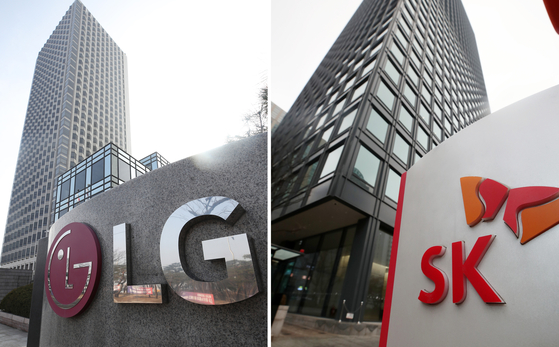![LG headquarters in Yeouido, Seoul (left) and SK headquarters in Seorin-dong. [연합뉴스]](https://i0.wp.com/pds.joins.com/news/component/htmlphoto_mmdata/202103/08/ba49e1d5-1987-404b-99af-28632c455922.jpg?w=560&ssl=1)
LG headquarters in Yeouido, Seoul (left) and SK headquarters in Seorin-dong. [연합뉴스]
While LG and SK are confronting the amount of settlement money after the US International Trade Commission (ITC) decided on the battery dispute, LG proposed a comprehensive damage compensation method similar to the Botox dispute agreement to SK, and the result is noteworthy. Since ITC acknowledged the infringement of SK’s trade secrets and gave the hand of LG, LG has been demanding 2 to 3 trillion won in compensation. On the other hand, SK is sticking to the position that it can only give a settlement amount of 500 billion won.
LG “Agreed 400 billion won in Botox dispute with 1/10 battery”
According to the business world on the 8th, LG Energy Solutions recently proposed a comprehensive damage compensation method, including stock and technology usage fees (royalties), rather than a lump sum cash payment to SK Innovation. Three days ago, on the 5th, Jang Seung-se, general manager of LG Energy Solutions’ management strategy, said in a conference call, “If you look at the Meditox case, the Botox market is about a tenth of the lithium-ion battery, but we have agreed to a scale of 400 billion won.” If you make an offer that you have, we will be very flexible in negotiating the settlement method.”
The industry interpreted the reason why LG mentioned the Botox dispute as the purpose of pressing SK Innovation, which refuses to agree and compensate for damages even after the ITC decision. Medytox and Daewoong Pharmaceutical have been fighting over the infringement of Botox’s trade secrets, spending hundreds of billions of billions of dollars in legal expenses. In December of last year, the ITC made a final decision that “the import of Daewoong Pharmaceutical’s Botox product’Nabota’ to the US will be banned for 21 months.”

Contents of the agreement on the Botox dispute in the United States for’Meditox vs. Daewoong Pharmaceutical’. Graphic = Kim Eun-kyo [email protected]
Afterwards, the two sides reached an agreement in February this year before the ITC’s import ban came into effect. Evolus, which holds the copyright for Nabota, a botox product of Daewoong Pharmaceutical, in the United States, pays cash, royalties, and stocks to Medytox and Allergan. First, it pays $35 million (approximately 38 billion won) as a settlement amount, and gives royalties (over 10 years) for Nabota sales in the US, and a 16.7% stake in Ebolus. As a result, the ITC’s decision to ban Nabota from selling in the US was withdrawn, and Daewoong Pharmaceutical avoided the worst situation in which Botox sales in the US were blocked.
SK “President Joe Biden will veto”
Cha-ho Jeong, a professor at Sungkyunkwan University (Graduate School of Law), said, “The ITC decision aims to induce an agreement between the parties to the dispute.” “No.” ITC is not a judicial body under the direct control of the President of the United States, so it does not specify the amount of compensation for damages between the two. However, as President Joe Biden approves the ITC’s decision, SK cannot produce and sell vehicle batteries in the United States for the next 10 years.
SK is disagreeing with LG’s proposal. SK Innovation has not bent its position, “It plans to strongly ask President Biden to exercise the right to veto by actively addressing the problems of the ITC decision.” It is analyzed that the lack of liquidity caused by large-scale investments would have had an effect on SK Innovation’s disagreement with LG Energy Solution’s proposal. SK Innovation invested $2.5 billion (about 3 trillion won) in a plant in Georgia, and although it received orders from Ford and others, it posted a deficit of 4265 billion won last year.

LG and SK’s battery operating deficit. Graphic = Kim Eun-kyo [email protected]
Reporter Kim Young-min [email protected]
![]()
